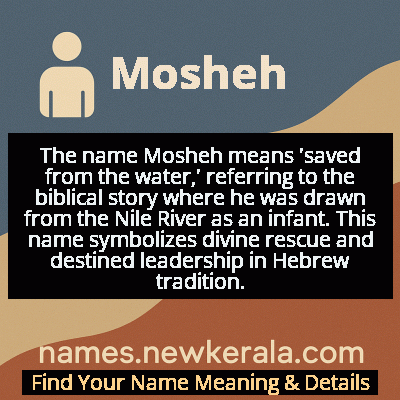Mosheh Name Meaning & Details
Origin, Popularity, Numerology Analysis & Name Meaning of Mosheh
Discover the origin, meaning, and cultural significance of the name MOSHEH. Delve into its historical roots and explore the lasting impact it has had on communities and traditions.
Name
Mosheh
Gender
Male
Origin
Hebrew
Lucky Number
5
Meaning of the Name - Mosheh
The name Mosheh means 'saved from the water,' referring to the biblical story where he was drawn from the Nile River as an infant. This name symbolizes divine rescue and destined leadership in Hebrew tradition.
Mosheh - Complete Numerology Analysis
Your Numerology Number
Based on Pythagorean Numerology System
Ruling Planet
Mercury
Positive Nature
Adventurous, dynamic, curious, and social.
Negative Traits
Restless, impatient, inconsistent, prone to indulgence.
Lucky Colours
Green, white.
Lucky Days
Wednesday.
Lucky Stones
Emerald.
Harmony Numbers
1, 3, 9.
Best Suited Professions
Sales, marketing, travel, entertainment.
What People Like About You
Versatility, charisma, adventurous spirit.
Famous People Named Mosheh
Moshe Rabbeinu
Biblical Prophet and Leader
Led Israelites from Egyptian slavery and received Torah at Sinai
Moshe Dayan
Military Leader and Politician
Key figure in Six-Day War and shaping Israeli defense policy
Moshe Feinstein
Rabbi and Halakhic Authority
Influential 20th century Orthodox Jewish legal decisor
Moshe Safdie
Architect
Designed iconic structures worldwide including Habitat 67
Name Variations & International Equivalents
Click on blue names to explore their detailed meanings. Gray names with will be available soon.
Cultural & Historical Significance
In Jewish tradition, Mosheh is considered the greatest prophet who ever lived, and his life story serves as a foundational narrative of redemption, faith, and covenantal relationship. The name continues to be particularly significant in religious contexts, often given to boys with the hope they will embody Mosheh's qualities of leadership, wisdom, and dedication to their community. Beyond Judaism, the figure of Moses is significant in Christianity and Islam, making the name recognizable across Abrahamic traditions, though with particular depth in Jewish identity and practice.
Extended Personality Analysis
Individuals named Mosheh are often perceived as natural leaders with strong moral convictions and a deep sense of responsibility toward others. They tend to exhibit wisdom beyond their years, combined with a humble demeanor that makes them approachable yet respected. These individuals typically possess excellent communication skills and the ability to mediate conflicts, reflecting the biblical Mosheh's role as a leader and lawgiver. There is often an intellectual depth to those bearing this name, with many showing interest in philosophical, spiritual, or ethical matters.
They are frequently described as patient, determined, and resilient, capable of persevering through challenges while maintaining their principles. The name carries expectations of integrity and reliability, with many Moshehs developing a strong sense of justice and fairness. While they may sometimes struggle with self-doubt or feel the weight of expectations, they generally rise to challenges with courage and conviction, often becoming pillars in their communities or families. Their leadership style tends to be more transformative than authoritarian, focusing on empowering others and building consensus.
Modern Usage & Popularity
In contemporary times, Mosheh (typically spelled Moshe in modern Hebrew) remains a popular name primarily within Jewish communities worldwide. It maintains strong religious and cultural significance, particularly among Orthodox and traditional Jewish families. The name has experienced consistent usage rather than dramatic popularity swings, reflecting its status as a classic rather than trendy choice. In Israel, Moshe has been among the top 100 boys' names for decades, though its popularity has slightly declined as more modern Israeli names gain traction. Outside Israel, the name is most common in Jewish diaspora communities in North America, Europe, and other regions. While the English variation 'Moses' sees some use in broader Western contexts, 'Moshe' remains distinctly Jewish-identified. The name continues to be chosen for its deep cultural roots, religious significance, and the positive attributes associated with the biblical figure.
Symbolic & Spiritual Meanings
The name Mosheh carries rich symbolic meanings beyond its literal translation of 'drawn from water.' Water symbolizes both danger and salvation in the naming story, representing the transition from potential death to divinely ordained life. This establishes Mosheh as a symbol of redemption and transformation—someone who emerges from threatening circumstances to fulfill a higher purpose. The name also symbolizes leadership tempered by humility, as the biblical Mosheh was described as the most humble man despite his monumental role. It represents the bridge between divine revelation and human understanding, embodying the concept of transmitting sacred wisdom to the community. Additionally, the name symbolizes liberation and covenant, reflecting Mosheh's dual role as liberator from physical bondage and facilitator of spiritual covenant. The water imagery further connects to purification, wisdom, and the flow of tradition from generation to generation.

